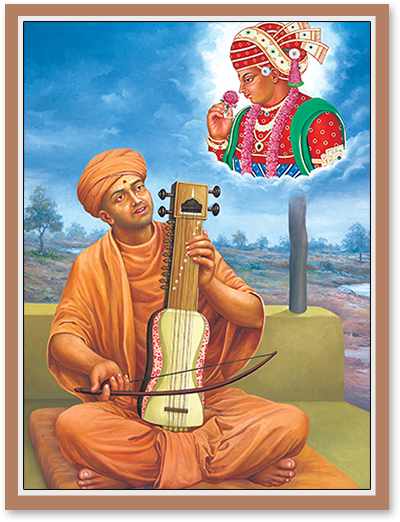

Rarely does one hear about a saint who is also a perpetual musician and song composer. Premanand Swami was one such gifted saint. According to one estimate this supreme saint of Shree Hari composed more than 14000 devotional songs out of which about one third have been published so far. Whether the devotee in him was greater than the poet or the poet in him was greater than the devotee is a moot question.
As a great musician he could play instruments like Sarangi so well that he could utilize 84 different sound pitches on it which perfectly coincided with any tone or tune.
His talent has been praised by many scholars. Kanaiyalal Munshi one of the greatest literary persons of Gujarat wrote about him: “After Narsimha Mehta of the middle ages, Premanand Swami exhibited absolute devotion.” The great literary critic Anantrai Raval wrote: “His poems are remarkable for melodious taste.”
Premanand Swami was born at the village of Ogana in Bharuch district of Gujarat state of India in Samvat 1835. Misguided by an astrologer his father deserted the new-born boy at some isolated place. He was picked up by a large-hearted Muslim who brought him up. When he shifted to Ujjain he made arrangements for the child to learn music. With sonorous sweet voice and expertise in playing sarangi he won the hearts of all wherever he went.
Once when Swami Jnandasji was returning from the Swaminarayan temple at Dhoraji he heard Premanand Swami singing and playing Sarangi. He was singing a song of separation so pathetically that he cultivated close contact with him and said: “The momenthas come and you shall not sing anymore songs of separation, soon you will meet God in the form of Shree Hari”.Jnandasji entrusted him to Shree Hari who permitted him to compose and recite the devotional songs that can be played on sarangi.
Premanand Swami was formerly named as Nijabodhanand but Shree Hari later gave him the name Swami Premanand.When Premanand Swami sang the famous devotional song“Vandu Sahajanand Rasa Roop,” Shree Hari declared at the religious meeting: “I would like to bow down at the feet of such a saint.”
Mesmerizingly he always sang about the separation of the soul from God and this was based on the Vishishtadwaita philosophy that - the soul maintains its distinct identity and can never be completely one with God.Once He sang a devotional song in four languages to the great surprise of the audience.
A band of musicians from Gwalior state demonstrated their skills before the Nawab of Junagadh, but the Nawab said: “After listening to Premanand Swami I feel none can play music better than him.” The musicians who were disappointed and they decided to prove that they could sing better and so they came to Gadhada. At the religious meeting Shree Hari asked Premanand Swami to sing the musical mode Bhairav. The musicians were shocked as traditionally this musical mode is sung in the early morning. But eventhough it was afternoon it felt as if it was early morning. The musicians were held spell-bound. They sang after him. Now they knew how inferior their performance was.
Whenever Premanand Swami sang at the religious meetings, Shree Hari moved nearer and nearer to him and would snap his fingers for rhythm.
Premanand Swami stayed with Shree Hari for fifteen years (from Samvat 1871 to Samvat 1886). From then he survived for more twenty years only to sing the devotional songs that described the pain of separation from God. When he sang devotional songs of separation before the icon, (Murti) of Gopinathji at Gadhada Shree Hari used to manifest before him to pacify and console him.
For more advanced training in music Shree Hari had sent him to Barahanpur. Shreeji Maharaj used to say about him: “His love for God is superior to that of Gopis love for Lord Krishna.” Shree Hari called him by his nickname – Prema Sakhi.
Some of his devotional songs that were included in the Ashram Bhajanavali by Mahatma Gandhi are: ‘Ho Raisa Men to Shrarana Tihari’, ‘Main To Birda Bharose Bahunami’, ‘Bisara Na Jajo Mere Mita’.His devotional songs are compiled in – Premanand Kavya Part I and II, Brihat Kavya Dohan and Kirtan Sar Samgraha.He translated Shikshapatri into Duha meter of poetry.
It was Shree Hari’s wish that he compose at least eight devotional songs every day and Premanand Swami did so till he left for Akshardham.